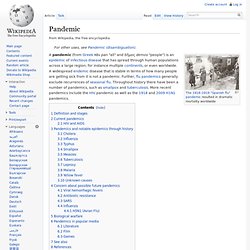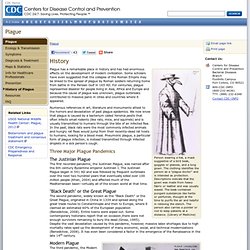

List of epidemics. Pandemic. A pandemic (from Greek πᾶν pan "all" and δῆμος demos "people") is an epidemic of infectious disease that has spread through human populations across a large region; for instance multiple continents, or even worldwide.

A widespread endemic disease that is stable in terms of how many people are getting sick from it is not a pandemic. Further, flu pandemics generally exclude recurrences of seasonal flu. Diseases and epidemics. British Sign Language description Audio description 'The ideal way to get rid of any infectious disease would be to shoot instantly every person who comes down with it.' H L Mencken Humanity and disease share a long and eventful history.

As we emerged and evolved, so did the diseases that blight our lives. Diseases exist in the fossil record, but our ancestors were actually less exposed to them. What did early people think about disease? Like their prehistoric ancestors, most Ancient Egyptians blamed evil spirits or angry gods. 7 Worst Killer Plagues in history (worst diseases, epidemics in history) Smallpox (430 BC?

- 1979): Killed more than 300 million people worldwide in the 20th century alone, and most of the native inhabitants of the Americas Smallpox (also known by the Latin names Variola or Variola vera) is a contagious disease unique to humans. Smallpox is caused by either of two virus variants named Variola major and Variola minor. The deadlier form, V. major, has a mortality rate of 30–35%, while V. minor causes a milder form of disease called alastrim and kills ~1% of its victims. Long-term side-effects for survivors include the characteristic skin scars. Smallpox killed an estimated 60 million Europeans, including five reigning European monarchs, in the 18th century alone. History of Plagues. The Black Death - Top 10 Terrible Epidemics. Few events in European history seem as cataclysmic as the Black Death.

The plague — which most historians believe was the bubonic plague, though others have suggested an ebola-like virus — is thought to have originated around the Black Sea region and spread rapidly through much of Europe and parts of Asia among rats nestling in the bowels of grain ships. The pandemic's most devastating moment was a four-year spell between 1347 and 1351 that, according to some estimates, wiped out as much as two-thirds of Europe's population. Top 10 Worst Plagues In History. Health History is dotted with epidemics and plagues, but a certain number of them stand out as unique for their severity and impact on future generations.

Eastern European Plagues and Epidemics 1300-1918. Plagues and Epidemics, by theplumber.com. One of our main sponsors since 1995: please visit: to International Toilet History in India and the World The first epidemic of a waterborne disease probably was caused by an infected caveman relieving himself in waters upstream of his neighbors.

Perhaps the entire clan was decimated, or maybe the panicky survivors packed up their gourds and fled from the "evil spirits" inhabiting their camp to some other place. As long as people lived in small groups, isolated from each other, such incidents were sporadic. But as civilization progressed, people began clustering into cities.
As cities became crowded, they also became the nesting places of waterborne, insect borne, and skin -to-skin infectious diseases that spurted out unchecked and seemingly at will. 10 Worst Epidemics. Few words in the English language encapsulate as much horror, misery and doom as "plague.

" After all, infectious diseases have inflicted a great deal of damage throughout the centuries. They've decimated whole populations, ended blood lines, claimed higher casualties than wars and played pivotal roles in charting the course of history. Early humans were no strangers to disease. They encountered the microbes that cause illness in drinking water, food and the environment. Occasionally an outbreak might decimate a small group, but they never encountered anything close to the widespread illnesses of the ages to follow. Humans also opened themselves up to new and deadlier diseases by domesticating animals that boast their own microbes. As humans expanded their territory, they came into closer contact with microbes they might otherwise have never encountered.
History - Plague. Person wearing a hat, a mask suggestive of a bird beak, goggles or glasses, and a long gown.

The clothing identifies the person as a "plague doctor" and is intended as protection. Descriptions indicate that the gown was made from heavy fabric or leather and was usually waxed. The beak contained pungent substances like herbs or perfumes, thought at the time to purify the air and helpful in relieving the stench. The person also carries a pointer or rod to keep patients at a distance. Disasters: Natural & Man-Made - Epidemics & Plagues. The Great Plagues: Epidemics in History from the Middle Ages to the Present Day. The Great Plagues: Epidemics in History from the Middle Ages to the Present Day Epidemic diseases have been as important as war in their devastating effects on human society through the ages.

This series of lectures looks at them in their relation to society, the economy, culture and ideas, and the state. History - British History in depth: Black Death. Did the plague help finish off the Roman Empire? Researchers find traces of killer 'Black Death' bug. Bacterium that causes plague, Yersinia pestis, found in remains from the 6th century AD Justinianic Plague of the sixth to eighth centuries believe by some to have triggered the downfall of the Roman EmpirePandemic named after the Byzantine emperor Justinian I, and killed more than 100 million people By Mark Prigg Published: 15:51 GMT, 13 May 2013 | Updated: 10:59 GMT, 14 May 2013.
